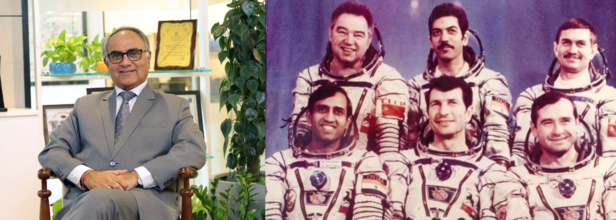
Credits: Canva
After Pig Kidney Transplants, Scientists May Have Found A Way To Transplant Pig Livers
Organ transplants involve replacing a failing organ with a healthy one from a donor. However there is always a shortage of human organ donors, and so scientists have been exploring xenotransplantation—using organs from animals, particularly pigs, for human transplantation.
Recently, Chinese researchers have reported significant progress in the field of xenotransplantation. A patient in China had successfully got her gene-edited pig kidney. This has made her the third person worldwide to live with such a transplant. Dr Lin Wang, a researcher at Xijing Hospital of the Fourth Military MEdical University in Xi'an, stated that nearly three weeks after surgery, the patient is now in good health. The pig kidney too is functioning well. As per the Chinese media, the recepienet was a 69-year-ols woman who had been living with kidney failure for the last 8 years.
What Are The Challenges Of Such Transplants?
The idea of using pig organs for human transplants is not new, however, it is in the recent times when attempts have been made in the US and in China. There were two initial attempts in the US that involved transplanting pig hearts and kidneys, however, the patients did not survive long. Though, two additional pig kidney transplants performed in the US- one in Alabama in November and another in New Hampshire in January- have been successful so far.
Despite these advancements, xenotransplantation still faces hurdles. The main challenge that remains for scientists is to overcome the risk organ rejection, immune system responses, and ensuring long-term functionality. Nonetheless, a US clinical trial on pig organ transplants is also set to begin soon, which will mark another step toward making these procedures more viable.
Is There A Potential For Pig Liver Transplants?
Researchers have now started looking beyond hearts and kidneys. There could be a possibility of transplanting pig livers. In the journal Nature, Dr Wang's team reported that they implanted a pig liver into a brain-dead patient, where it had survived for 10 days without early signs of rejection. The liver was also able to produce bile and albumin, which are essential functions of the organ. However, these productions were made at lower levels than a human liver.
The liver transplant is particularly more challenging because it has vital roles like filtering toxins, breaking down nutrients, fighting infections, storing iron, and regulating blood clotting. While the recent experiment did show limited functionality, Wang believes that there could be more to it. It could serve as a temporary support for patients with liver failure, which could be similar to dialysis for kidney patients.
Has There Been Attempt To Transplant Pig Liver Before?
Yes, this is not the first time scientists have experimented with pig liver transplants. Last year, researchers at the University of Pennsylvania in the U.S. attempted an external attachment of a pig liver to a brain-dead patient to filter blood. A Chinese hospital also reportedly performed a pig liver transplant on a living patient who had part of his cancerous liver removed, though details of the outcome remain unclear.
In another experiment, Wang’s team implanted a pig liver alongside a human liver in a brain-dead patient, rather than removing the human liver entirely. Experts believe this approach complicates the results, as it does not fully replicate a liver transplant scenario.

'I Felt Like I Was Going to Die'-Oprah Winfrey’s Shares Her Menopause Struggle
For most women, this reality is what menopause feels like, a time when hormonal changes impact everything from sleep routines to mood stability. Oprah Winfrey recently shared her own personal battle with menopause, exposing how it left her unable to read her favorite books or even host her famous book club. In a candid conversation, Winfrey explained how the overwhelming symptoms—especially heart palpitations and an inability to concentrate—left her feeling like she was “literally going to die every single night.”
It’s a topic that’s often kept behind closed doors, but menopause affects millions of women globally. According to the National Institute on Aging, menopause is reached when a woman has had no period for 12 months in a row, normally between the ages of 45-55, and may create a variety of symptoms ranging from hot flashes to emotional upset. Oprah's announcement of her own menopause experience highlights the not-so-well-known symptoms and raises awareness of the need for greater information and support. Let's take Oprah's journey and see how we can learn more about and cope with this natural but too-often-misunderstood phase of life.
But media mogul Oprah Winfrey is breaking that. In a recent interview, Winfrey, 71, spoke candidly about her own menopause experience, describing an ordeal so overwhelming that she thought she was "going to die every single night."
Winfrey's confession is not simply another celebrity revelation—it's a wake-up call for millions of women across the globe who suffer from menopausal symptoms in ignorance, without proper medical attention, or public support.
Menopause, that phase of life when a woman's menstrual cycle permanently ceases because of the decrease in estrogen and progesterone levels, is usually coupled with symptoms of hot flashes and night sweats. But in Winfrey's case, it was different—though no less unsettling.
One of the most surprising and disturbing symptoms that she experienced was one of inattention. An avid reader since childhood and the face of Oprah's Book Club, she discovered that she couldn't read.
The worst for me, this is when I realized I really was in trouble, is when I couldn't focus reading," Winfrey explained to ABC News' Kayna Whitworth. "I adore reading so much, but I abandoned the book club because I could not focus when I was reading. I could no longer complete a book.
It wasn't until she began hormone therapy with estrogen that she regained her concentration. "I brought back [the book club] when I began taking estrogen because I could concentrate again, but I actually never mentioned that before," she confessed. "It makes me want to cry."
Lesser-Known Symptoms of Menopause
Although night sweats and hot flashes are universally acknowledged as symptoms of menopause, other physical and psychological consequences tend to go unmentioned. Winfrey felt palpitations of the heart—a symptom she never correlated with menopause.
"I did not have night sweats, and I did not have hot flashes, but I had never heard that palpitations [were] a symptom of menopause," she explained. "When I was going through it, there was nothing. There was nobody."
This absence of knowledge concerning the entire range of menopausal symptoms is a crucial concern. Menopause influences each woman uniquely, with some suffering from anxiety, depression, insomnia, mental fogginess, or even arthritis, says the National Institute of Health (NIH). And though it touches everyone equally, menopause has been among the least talked about and most under-studied topics in women's health.
Committed to making sure that other women do not have to endure in silence, Winfrey is leveraging her platform to ignite a long-overdue discussion. Her new Hulu special, An Oprah Winfrey Special: The Menopause Revolution, seeks to inform and empower women on menopause, offering expert advice and real-life stories to guide them through this stage of life with confidence.
She also tweeted to highlight how crucial it was to discuss menopause. "When I underwent menopause, I couldn't sleep for two years. I couldn't concentrate. I couldn't read my favorite books. I had heart palpitations. Nobody informed me about this. Now we're discussing it, so no woman suffers," she posted on Facebook.
Winfrey's advocacy is part of a larger effort to make menopause conversations mainstream and better healthcare responses. Women should have access to proper information and healthcare providers who seriously consider their symptoms.
What Women Need to Know About Seeking the Right Medical Support?
Winfrey's experience teaches an important lesson: women need not be afraid to get a medical consult when they are experiencing symptoms of menopause. "Because it hits every cell in your body, the first time you have any of the symptoms, that's when you need to go go find a doctor who will hear you, listen to you, and take action for you," she encouraged.
Far too frequently, women's menopausal symptoms are downplayed, and they must cope with the changes by themselves. Professionals advise going to see a gynecologist or a menopause specialist as early as perimenopause—the pre-menopause phase—so that possibilities such as hormone therapy, lifestyle modifications, and other forms of treatment can be discussed.
Oprah Winfrey's honest narrative about her battle with menopause is a call to change the way society understands and responds to this natural phenomenon. It's about tearing down the taboo and myth surrounding menopause so that future generations of women will be better equipped and empowered.
With powerful voices such as Winfrey at the forefront, menopause is no longer a silent battle—it's a dialogue that must be heard.

(L to R) Lt Gen Dr Vimal Arora; Rakesh Sharma with Soyuz T-11 crew (source: Russian House, New Delhi)
Exclusive: Astronaut Rakesh Sharma Had To Get His Wisdom Tooth Extracted Before His Trip To Space
In an exclusive interview with Health and Me, Lt Gen Dr. Vimal Arora who is the Chief Clinical Officer (CCO) at Clove Dental talked about his experiences of treating the former Presidents of India and the time when he served as one of the doctors at the Air Force Institute of Dental Sciences in Bengaluru.
In 1982, Rakesh Sharma was selected as a cosmonaut for a joint Soviet-Indian spaceflight. With him, ex IAF Pilot Ravish Malhotra was also selected who was trained to fly on that mission as a backup for Rakesh Sharma. For this mission, Sharma was rigorously trained at Moscow's Yuri Gagarin Cosmonaut Training Center for two years. He also underwent a test for claustrophobia in Bengaluru's Indian Air Force facility with being locked in a room for 72 hours for the test.
It was there only when Dr Arora had come across the case. "I was young in Bengaluru, and we had these India astronauts who would go along with Russian astronauts and the medical were also going on. At that time, I distinctly remember Rakesh Sharma and Ravish Malhotra and only one of them were supposed to go," he shares.
It was there when Dr Arora got caught in a debate with regards to their medical checkup. It was on whether the astronauts should have their wisdom tooth removed.
"Their dental checkups were done and we were told that their wisdom teeth had to be taken out. We were fighting with them (Russian doctors)," Dr Arora shares.
"I said, 'they are perfectly fine, why is there a need to extract their tooth? It is not going to cause any trouble.' But it was made very clear from the Russians and their team of doctors and dentists that wisdom teeth must be removed."
The reason for this was, as Dr Arora explained, the astronauts, the mission and everyone else who have invested in the spaceflight could not let a wisdom tooth ache become a issue to cancel the trip. Even if there is a chance that this may cause tooth pain, the trip had to be called back and the team could not afford that.
"This is when I learned the wisdom tooth has to go away. It was a different lesson for me at that time," he shares.
After that, Dr Arora says that many more things had enlightened him, including the first intra oral full mouth x-ray machines which had also been imported there.
He says that dentistry has changed unimaginably. The amount of technology that dentists used is not used in any other health sector.
His experiences do not just end there. He has also treated the former Presidents of India including Dr APJ Abdul Kalam and Dr Pranab Mukherjee.
"What makes them stand apart was the simplicity with which they treated the doctor. I remember that I was more nervous when I had to talk to Dr Kalam. But he always had this child-like simplicity and child-like curiosity. He always left with some kind of messages and it gave me a different lesson in my life."

Photo by researchers at UCSF and UC Berkeley shows Ann, a participant in a study on speech neuroprostheses, in California in 2023. (Noah Berger/UCSF, UC Berkeley via AP)
A Brain-Computer Interface Made A 47-Year-Old Stroke Survivor Speak Again After 18 Years; Here's How It Works
In this immensely changing space of technology and medical sciences, scientists have now developed a groundbreaking device, which can translate thoughts into spoken words in real time. This experimental brain-computer interface (BCI). This could also help people who are unable to speak to regain their voice.
The implant can detect brain activity which is related to speech and convert it int words. Unlike previous BCIs, which often would have delays, this new system can process speech almost instantly. It can also make conversations smoother and more natural.
Has This Technology Been Tested? What Were The Results?
In a clinical trial, doctors implanted this device in a 47-year-old woman who had lost her ability to speak due to a stroke 18 years ago. During this process, electrodes were placed on the speech center of her brain. This captured neural signals.
Once the implantation was done, the researchers trained the system to recognize her brain activity. They used artificial intelligence (AI) to translate her neural signals into speech sounds. They were also able to recreate the sound of her original voice using the recordings the woman had before she suffered the injury.
What About Real Time Speech Conversion?
The older BCIs required users to think of an entire sentence before translating it. However, with this system, the processing of speech is done in smaller segments. In every 80 milliseconds, which is about half a syllable, the implant sends data for immediate translation. This way the implant allows for a more natural and fluid conversation experience.
AI has been playing a crucial role in medicine. For this, AI plays a crucial role in the success of this implant. It deciphers neural activity and matches it to specific sounds and words. The system is also similar to speech-to-text technology which have been used in smartphones. However, this one has been tailored to interpret brain signals instead of spoken words.
ALSO READ: Woman Thought It Was Just Grief And Anxiety, Until ChatGPT 'Diagnosed' Her With Blood Cancer
What More Could Be Done In Future? Are There Any Exciting Future Prospects?
This is a new approach, especially to brain-computer communication. In fact, scientists and healthcare professionals believe that it could revolutionize the way people with speech impairments interact with the world. While it is currently in the experimental phase itself, there is a lot of hope that researchers have with its results, along with the continuous funding and new developments. The researchers hope that soon this technology will be available for medical use. The soon for them is within a decade.
While results are promising, more research is required to refine the technology and to make it more accessible for a wider audience, especially those who are disproportionately affected by such conditions. Scientists also aim to improve accuracy, expand vocabulary recognition, and ensure the implant works for various speech impairment.
The ability to translate thoughts directly into speech is a major advancement in neuroscience and assistive technology. With further development, this innovation could restore communication abilities for people who have lost their voices, opening new possibilities for independence and interaction.
© 2024 Bennett, Coleman & Company Limited

